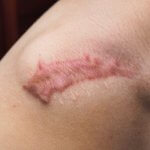The results reported from Phase II of the first FDA-approved trial for the treatment of multiple sclerosis (MS) using stem cells are highly promising, suggesting that stem cells could be a viable treatment option to help improve the lives of those with the condition. [1]
What is the MS trial?
The Phase II trial, which was carried out by The Tisch MS Research Center of New York, constitutes the next stage in the development of the groundbreaking research signalled by the results from Phase I, the first FDA-approved trial to explore the injection of stem cells for MS.
The Phase II trial involved 54 patients split between a test group and a control group in a randomised, double-blind, placebo-controlled study.
Members of each group received 6 injections of either autologous (meaning their own) mesenchymal stem cell-derived neural progenitors (MSC-NPs) or saline placebo every two months.
These injections were administered into the cerebrospinal fluid of multiple sclerosis patients.
The study utilised a cross-over model by which patients who received the stem cell injections in year 1 were then given the saline placebo in year 2 and vice versa.
How does the stem cell treatment work?
Building on their findings from Phase I, researchers identified MSC-NPs for the treatment having ascertained that they promote tissue regeneration and immunomodulatory effects, in addition to being safe and well tolerated. [2]
MSC-NPs are a subpopulation of mesenchymal stem cells that can upregulate growth factors like hepatocyte growth factor (HGF), and minimise ectopic differentiation – essentially, the abnormal differentiation of cells.
By injecting them into the cerebrospinal fluid – a process called intrathecal (IE) injection – researchers found in an experimental autoimmune encephalomyelitis (EAE – an accepted way of modelling the effects of MS) mouse model that MSC-NPs were associated with increased spinal cord myelination, neurological recovery and reduced immune infiltration into the central nervous system. [3]
What were the results?
The results of the Phase II trial demonstrated huge promise for the use of stem cells in treating MS.
Patients requiring walking assistance saw significant improvements in both a timed 25-foot walk test and a 6 minute walking test than those in the control group.
Additionally, treatment recipients demonstrated improved bladder function, with 69% showing improvements in post-void residual volume.
Amongst the other findings were indicators that these stem cells could be helping to restore neuronal cells and reverse cognitive decline in patients with less advanced disease progression.
Furthermore, the stem cell treatment occasioned notable biomarker changes in cerebro-spinal fluid, especially with regards to the decreased levels of CCL2, a protein associated with inflammation, and the increased levels of MMP9, an indicator of the increased presence of reparative cells. [4]
Overall these findings are extremely promising, indicating that stem cells could be used in future treatments that may help to reverse many of the most debilitating aspects of multiple sclerosis, like disability.
The next stage in the study will be for researchers to investigate the effects of increasing the stem cell dosage.
What does this mean for cord blood banking?
This trial is just the latest example of the regenerative potential stem cells have to help treat life-changing conditions like MS.
As exemplified by this study, mesenchymal stem cells in particular, with their immunomodulatory and tissue repair properties, are especially promising.
Incredibly, the umbilical cord and placenta are one of the richest sources of these stem cells, but are routinely thrown away after birth.
By saving these for your baby, you could be giving them the key to future therapies for everything from cancer and stroke to diabetes and heart disease.
The potential offered by stem cells is vast, but you only get one chance to save your baby’s stem cells, and that’s the day they’re born.
To find out more about cord blood banking and how it could protect your family’s health, fill out the form below to request a free Welcome Pack.
References
FIND OUT MORE, REQUEST YOUR WELCOME PACK TODAY
All you need to know to make an informed decision.
Provide your contact details to request:
– Complete Welcome Pack and Parent’s Guide
– Information via email
– Contact from our specialist advisors









